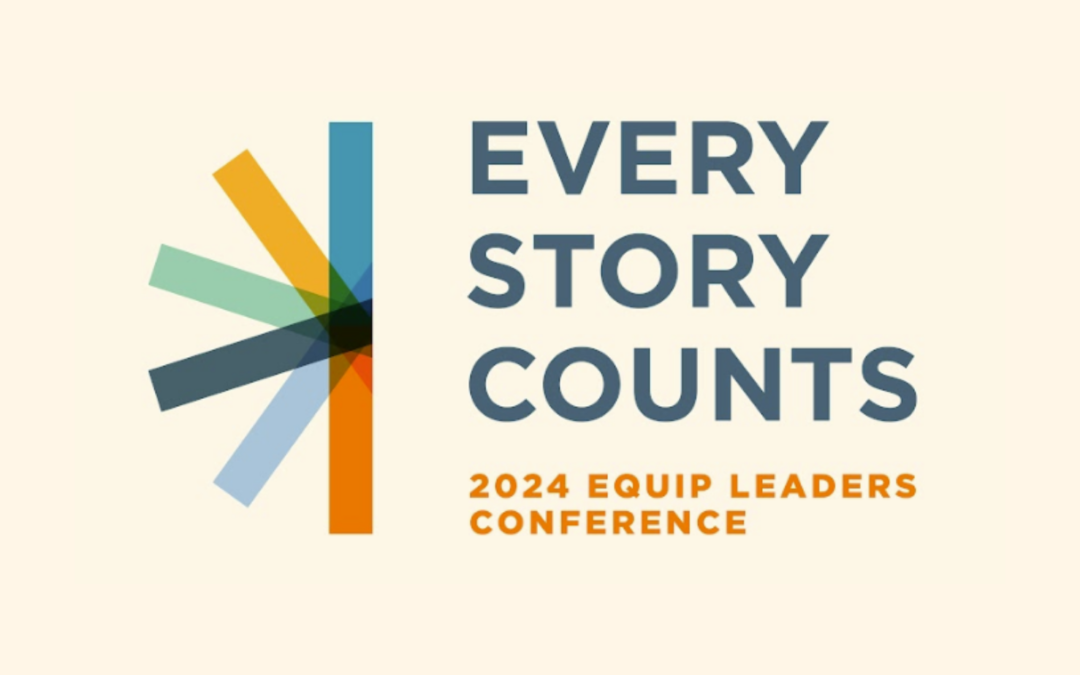
Pastor Joe, Who Should I Vote For?
“Pastor Joe, who should I vote for?”
The question was posed to me in the church hallway a few weeks ago by a woman who genuinely wanted my opinion. Her concern centered on the fact that each party and politician has flaws. At the risk of sounding cheesy, Jesus isn’t running for office this year.
So what do we do? How should Christians vote?
Fewer people talk to me about politics at church these days. This might be because my regular refrain is that our hope is not in who runs our country. That’s not to say it’s unimportant, but it’s certainly not as crucial as some make it out to be. It breaks my heart when politics become so important that it ruins the bond of love between fellow believers. Satan wins when that happens.
I often remind people that Jesus was born into the Roman Empire, a time when the ruler over his backwater town was so hellbent on killing him that he ordered the murder of every baby boy two years old and under. A horrific tragedy for sure, but Jesus didn’t refocus his efforts on reforming the Empire or calling for Herod’s ouster. Instead, he went about ushering in a completely different kind of kingdom. And if you’re a Christian, I’d encourage you to do the same. Pay attention to how much time you spend focused on American politics versus building God’s kingdom.
I don’t believe that politics belongs in the pulpit. Some disagree with me, and that’s okay. Biblical morality belongs in the pulpit to be sure, but not politics. When the issues present themselves in the regular rhythm of preaching through books of the Bible, I gladly and passionately address them. There are moral issues of our day to which the Bible speaks, and it’s the job of every pastor to address them. But I am wary of churches and pastors that seem focused on bringing the Kingdom of God through the United States government.
But I’m hardly apolitical. I enjoy politics. I’ve watched all the debates, I pay close attention to the news, and I like watching the Senate Judicial Committee videos on YouTube. I have strong political opinions, but I have even stronger Christian convictions. And I constantly remind our church that our hope is not in getting the right candidate into office—as if that would solve all of our country’s problems.
But what about abortion? Isn’t that the end-all-be-all topic for Christians? Abortion is an important issue because it involves human life and dignity. Yet, historically, politicians haven’t moved the ball much. Even with the reversal of Roe in 2022, the following year saw record-breaking numbers of abortions in the U.S.. Sadly, there’s no pro-life platform this year: the Harris/Walz ticket views abortion as a right, while the Trump/Vance ticket frames it as a states’ issue so that they can play both sides for political gain.
I could go on about each issue, and there are godly, Christ-centered, born-again believers who will come down on different sides. And yet, most will be utterly flabbergasted that another Christian could even consider voting differently than them. So, what do we do?
Here are two filters by which I consider my vote and two challenges for how to live in politically polarizing times. They’re not the only considerations, but they’re a biblical guide for me and I hope they’ll be helpful for you.
A few notes before we start
- I use the language of voting for a “platform” as opposed to a person. No candidate can fully deliver on their promises, but their platform gives me a sense of what they stand for.
- I encourage you to go to the candidates’ websites and learn what they believe directly from them. I haven’t found a site that lays out the issues in a truly non-partisan way.
- This post is not a complete treatment of every issue. My aim is to provide some guidance for Christian voting. For deeper study, I recommend Wayne Grudem’s Politics According to the Bible, a comprehensive conservative, evangelical tool—even if I don’t agree with all his conclusions.
Filter #1: Aim to honor the authority that God has put in place.
The Bible commands me to honor the authority put in place over me (because God puts them in authority), so I want to vote for the platform that enables me to do that with the clearest conscience.
“Let every person be subject to the governing authorities. For there is no authority except from God, and those that exist have been instituted by God. Therefore whoever resists the authorities resists what God has appointed, and those who resist will incur judgment.” (Romans 13:1-2)
“Be subject for the Lord’s sake to every human institution, whether it be to the emperor as supreme, or to governors as sent by him to punish those who do evil and to praise those who do good. For this is the will of God, that by doing good you should put to silence the ignorance of foolish people. Live as people who are free, not using your freedom as a cover-up for evil, but living as servants of God. Honor everyone. Love the brotherhood. Fear God. Honor the emperor.” (1 Peter 2:13-17)
Yes, if a government leader asks you to sin, you must disobey (Acts 4:19-20). But that doesn’t give us an excuse to dishonor leadership or break the law. In his sovereignty, God has used flawed leaders for his purposes for a long time. No one is in power anywhere in the world at any time who has not been put there by God. That’s why Paul calls us to be subject to governing authorities—it’s grounded in God’s authority. When we dishonor governing authorities in areas where we’re not being forced to sin, we dishonor God’s name.
So, I vote for the platform that allows me to follow this command as best I can. My goal is to have as few disagreements that force me to dishonor or disobey authority as possible. This means I need to know my Bible better than I know politics. Start from the Bible and work out from there. Don’t bring your political opinions to the Bible and try to find verses to back them up. Know the heart of God, learn about what pleases him, and compare those things to the platforms proposed.
Filter #2: Seek a platform that allows the church to thrive
If the church is God’s plan to accomplish the Great Commission—and it is—I want to vote for a platform that allows the local church and its members to thrive in our mission.
“And Jesus came and said to them, ‘All authority in heaven and on earth has been given to me. Go therefore and make disciples of all nations, baptizing them in the name of the Father and of the Son and of the Holy Spirit, teaching them to observe all that I have commanded you. And behold, I am with you always, to the end of the age.'” (Matthew 28:18-20)
“First of all, then, I urge that supplications, prayers, intercessions, and thanksgivings be made for all people, for kings and all who are in high positions, that we may lead a peaceful and quiet life, godly and dignified in every way. This is good, and it is pleasing in the sight of God our Savior, who desires all people to be saved and to come to the knowledge of the truth.” (1 Timothy 2:1-4)
Jesus gives us our marching orders in Matthew 28. This is the goal—plain and simple. As my dad used to say, “everything else is gravy.”
As I write this, I’m painfully aware that the church can thrive even under persecution—historically, it often has. But we shouldn’t ignore the blessings of freedom. Paul’s prayer above is for a peaceful society, allowing the church to flourish, proclaim the gospel, and live in a way that honors God. A platform that allows freedom for religious practice, protects the right to gather, and enables believers to live out their faith publicly can help advance the work of the church. A platform that supports biblical morality is even better.
When considering how to vote, I look at policies that impact religious liberty, free speech, and the church’s ability to operate without interference. Platforms that restrict the church’s ability to preach the gospel or force believers to compromise on core biblical convictions are concerning. Similarly, I avoid platforms that hinder my family or our church from living out our faith in all areas of life.
Challenge #1: Don’t let politics break the bonds of peace and love among believers
“A new commandment I give to you, that you love one another: just as I have loved you, you also are to love one another. By this all people will know that you are my disciples, if you have love for one another.” (John 13:34-35)
“Finally, brothers, rejoice. Aim for restoration, comfort one another, agree with one another, live in peace; and the God of love and peace will be with you.” (2 Corinthians 13:11)
This is my primary concern when it comes to politics in the church, and I believe it’s Jesus’ primary concern as well. In his final prayers, Jesus prays for his disciples to love one another, be unified, and be protected from the evil one. When we let politics break unity and violate the law of love, we give Satan space to divide and devour.
One of my issues with social media is that it makes us more flippant with our words. We say things online we’d never say face-to-face because it’s easier. We argue from behind a keyboard, trying to sound smarter, but we’re rarely winsome. We rarely build the bonds of Christian love and unity. Instead, we end up looking foolish as the world watches us come unhinged over a Facebook comment.
Talk about our country and the issues that need discussing. Show genuine concern for immoral platforms and behavior among our leaders. But do it face-to-face when possible. And when not possible, ask someone to review your comments or posts before you hit send. Ask yourself, “Would Jesus write this?”
Challenge #2: Living out your biblical convictions matters more than your vote
“When the Son of Man comes in his glory, and all the angels with him, then he will sit on his glorious throne. Before him will be gathered all the nations, and he will separate people one from another as a shepherd separates the sheep from the goats. And he will place the sheep on his right, but the goats on the left. Then the King will say to those on his right, ‘Come, you who are blessed by my Father, inherit the kingdom prepared for you from the foundation of the world. For I was hungry and you gave me food, I was thirsty and you gave me drink, I was a stranger and you welcomed me, I was naked and you clothed me, I was sick and you visited me, I was in prison and you came to me.'” (Matthew 25:31-46)
If you skipped over that text, go back and read it. It’s too important to miss. Jesus is clear that his true followers act and live to care for the least. And he gives a few examples:
- Those without the basic necessities of food, drink, and clothing
- Those who are strangers in need of community and shelter
- Those who are sick and in need of comfort
- Those who are in prison
Here are some questions to consider:
- Abortion is a massive issue for Christians—as it should be. Do you do anything to support, love, or care for those facing unplanned pregnancies? Do you give to or volunteer at the Cleveland Pregnancy Center or other organizations that offer hope and support?
- Adoption is close to my heart because both of my kiddos are adopted. Do you care for orphans? Have you considered fostering or supporting those who do? Organizations focused on foster care and adoption need volunteers, resources, and support. How are you showing God’s love to vulnerable children who need a home and loving family?
- You probably have opinions on immigration? Political opinions aside, when a young family from another country moves in next door, how do you respond? An evangelism opportunity just moved into the neighborhood—what should your primary concern be?
- The laws in our justice system change all the time. Maybe you have opinions about how to prosecute or rehabilitate. But when was the last time you visited someone in prison to share the love and message of Jesus?
- Do you have strong opinions about homelessness? Do you actively seek to care for those without shelter? Have you ever volunteered at a local shelter or helped in meal services for the homeless? Jesus calls us to love and serve, not just have opinions.
There are 1,460 days between presidential elections. If you live to be 80 and vote in every election, you’ll vote for president 16 times—16 days when you cast your ballot. In those 80 years, you’ll have about 29,000 other days to be the hands and feet of Jesus. Your vote matters—prayerfully and biblically cast it. But you’ve got 1,460 days between elections to live out the convictions that drive your vote. You’ve heard the saying, “put your money where your mouth is.” How about “put your life where your vote is”? Use those 1,460 days to share the love and message of Jesus because there’s only one kingdom that is eternal, and you have an important role in bringing it about.
If you’re a Clevelander, you want to step into serving in one of these areas, and you’re not sure where to start, our church (Cuyahoga Valley Church) has intentionally partnered with 10 organizations in our city that serve various people in need with practical help and the good news of the Gospel. You can learn more about these organizations and get involved by visiting the CVC Local Mission Page.








